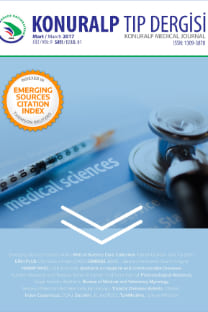Bir Tıp Fakültesinde Klinik Kayıt Tutma Eğitimindeki İhtiyacı Belirlemeye ve Klinik Kayıtlar Niteliği Üzerine Bir Çalışma
tıbbi dokümantasyon, klinik kayıt, ihtiyaç analizi, tıp eğitimi
Clinical Record Keeping Education Needs in A Medical School and The Quality of Clinical Documentations
medical documentation, clinical records, needs analysis, medical education,
___
- 1. Rowlands S, Coverdale S, Callen J. Documentation of clinical care in hospital patients' medical records: A qualitative study of medical students' perspectives on clinical documentation education. Health Inf Mana. 2016;45:99-106.
- 2. Kuhn T, Basch P, Barr M, Yackel T. Medical Informatics Committee of the American College of Physicians. Clinical documentation in the 21st century: executive summary of a policy position paper from the American College of Physicians. Ann Intern Med. 2015;162:301-3.
- 3. Haghighi MH, Dehghani M, Teshnizi SH, Mahmoodi H. Impact of documentation errors on accuracy of cause of death coding in an educational hospital in Southern Iran. Health Inf Manag. 2014;43:35-42.
- 4. Seo JH, Kong HH, Im SJ, Roh H, Kim DK, Bae HO, Oh YR. A pilot study on the evaluation of medical student documentation: assessment of SOAP notes. Korean J Med Educ. 2016;28:237-41.
- 5. Yılmaz BK, Topcu H, Acar YA. Assessment of legal obligations of physicians from emergency physician perspective. Med Bull Sisli Etfal Hosp. 2017;51: 142-8
- 6. Jackson T. Data quality: not selling ourselves short. Health Inf Manag. 2014;43:4-6.
- 7. Westbrook JI, Ampt A, Kearney L, Rob MI. All in a day's work: an observational study to quantify how and with whom doctors on hospital wards spend their time. Med J Aust. 2008;188:506-9.
- 8. Alromaihi D, Godfrey A, Dimoski T, Gunnels P, Scher E, Baker-Genaw K. Internal medicine residents' time study: paperwork versus patient care. J Grad Med Educ. 2011;3:550-3.
- 9. Oxentenko AS, West CP, Popkave C, Weinberger SE, Kolars JC. Time spent on clinical documentation: a survey of internal medicine residents and program directors. Arch Intern Med. 2010;170:377-80.
- 10. Friedman E, Sainte M, Fallar R. Taking note of the perceived value and impact of medical student chart documentation on education and patient care. Acad Med. 2010;85:1440-4.
- 11. Mezuniyet Öncesi Ulusal Çekirdek Eğitim Programı; 2020 [cited 2023 Jan 23]. Available from: https://www.yok.gov.tr/Documents/Kurumsal/egitim_ogretim_dairesi/Ulusal-cekirdek-egitimi-programlari/mezuniyet-oncesi-tip-egitimi-cekirdek-egitimi-programi.pdf
- 12. Köse A, Köse B, Öncü MR, Tuğrul F. Bir devlet hastanesi acil servisine başvuran hastaların profili ve başvurunun uygunluğu. Gaziantep Medical Journal. 2011;17:57-62.
- 13. Dönmez SS, Durak VA, Torun G, Köksal Ö, Aydın Ş. Acil Serviste Gerçekleştirilen Konsültasyon Sürecinin İncelenmesi. Uludağ Tıp Derg. 2017;43:23-8.
- 14. Borkan J. Immersion-crystallization. In: Crabtree BF, Miller WL, editors. Doing qualitative research (Research Methods for Primary Care) Newbury Park: Sage Publications; 1999. p. 179-84.
- 15. Lai J, Tillman D. Curriculum to Develop Documentation Proficiency Among Medical Students in an Emergency Medicine Clerkship. MedEdPORTAL. 2021;17:11194.
- 16. Dawson B, Carter K, Brewer K, Lawson L. Chart smart: a need for documentation and billing education among emergency medicine residents? West J Emerg Med. 2010;11:116-9.
- 17. Fakhry SM, Robinson L, Hendershot K, Reines HD. Surgical residents' knowledge of documentation and coding for professional services: an opportunity for a focused educational offering. Am J Surg. 2007;194:263-7.
- 18. Malekpour N, Noori A, SamadPour Amlashi T. Study of standard soap education effectiveness on correct progress note registering in medical records among surgical residents. J Med Educ Dev. 2018;11:81-93
- 19. Patel A, Ali A, Lutfi F, Nwosu-Lheme A, Markham MJ. An Interactive Multimodality Curriculum Teaching Medicine Residents About Oncologic Documentation and Billing. MedEdPORTAL. 2018;14:10746.
- 20. Sarzynski E, Foley K, Riekse R, Laird-Fick H, Keilman L, Barnikow T, et al. An OSCE to Assess Trainee Management of Complex Older Adults and to Teach Documentation, Coding, and Billing. MedEdPORTAL. 2014;10:9903.
- 21. Shen E, Cristiano JA, Ellis LR. The Electronic Health Record Objective Structured Clinical Examination Station: Assessing Student Competency in Patient Notes and Patient Interaction. MedEdPORTAL. 2020;16:10998.
- 22. Zavodnick J, Kouvatsos T. Electronic Health Record Skills Workshop for Medical Students. MedEdPORTAL. 2019;15:10849.
- 23. Hammoud MM, Margo K, Christner JG, Fisher J, Fischer SH, Pangaro LN. Opportunities and challenges in integrating electronic health records into undergraduate medical education: a national survey of clerkship directors. Teach Learn Med. 2012;24:219-24.
- 24. Hammoud MM, Dalymple JL, Christner JG, Stewart RA, Fisher J, Margo K, et al. Medical student documentation in electronic health records: a collaborative statement from the Alliance for Clinical Education. Teach Learn Med. 2012;24:257-66.
- ISSN: 1309-3878
- Yayın Aralığı: 3
- Başlangıç: 2009
- Yayıncı: Düzce Üniversitesi Tıp Fakültesi Aile Hekimliği AD adına Yrd.Doç.Dr.Cemil Işık Sönmez
Anadolu Kadınlarının Kadına Yönelik Şiddete İlişkin Görüş Tutum Ve Davranışları
Akademisyenlerin Beslenme Bilgi Düzeylerinin ve Akdeniz Diyetine Uyumlarının Değerlendirilmesi
Özge MENGİ ÇELİK, Sedef DURAN, Erkan ŞAHİN
Sibel ATEŞOĞLU KARABAŞ, Rukiye ÇİFTÇİ, Hilal ER ULUBABA, Atila YOLDAŞ
Emre EMEKLİ, Özlem COŞKUN, Işıl İrem BUDAKOĞLU, Yavuz Selim KIYAK
Genç Yetişkinlerde Ruh Sağlığı Okuryazarlığının Geçerlilik ve Güvenilirlik Çalışması (MHLq)
Nevin GÜNAYDIN, Funda ÖZPULAT, Duygu ÖZTAŞ, İnci AÇIKGÖZ
Sol Yan ağrısının Açıklanamayan Nadir Bir Sebebi: Nutcracker Sendromu
Ayşe KABA, Esat KABA, Cüneyt ARDIÇ
Evde bakım hizmeti alan geriatrik hastalarda disfaji prevalansı ve ilişkili risk faktörleri
Nur ŞİMŞEK YURT, Esra BÖCEK AKER
Obez Çocuklarda ve Sağlıklı Kontrol Grubunda Ön Segment Parametrelerinin Karşılaştırılması
Mehmet Tahir ESKİ, Kuddusi TEBERİK, Taha SEZER, İlknur ARSLANOĞLU
Hatice Mine ÇAKMAK, Dilek YEKENKURUL, Zehra ŞENGÜN, Selvi YENER, Pelin DURAN, Fatih DAVRAN, Kenan KOCABAY
Demir Eksikliği Olan Üreme dönemindeki Kadınlarda Demir Replasmanının Bilişsel İşlevlere Etkisi
